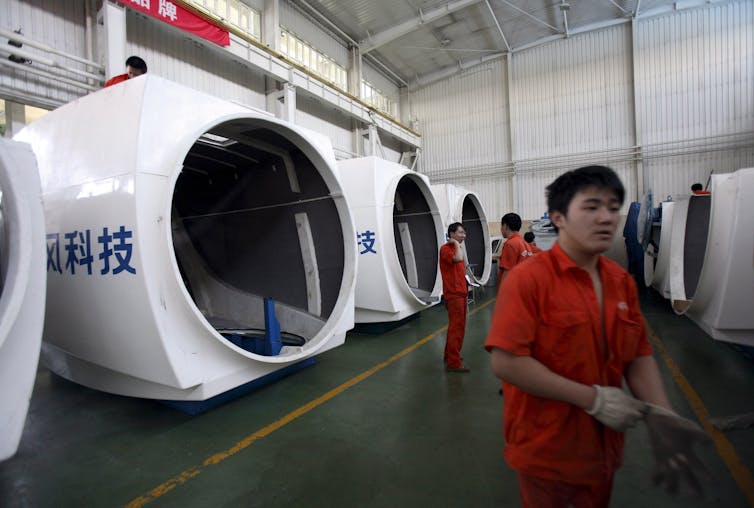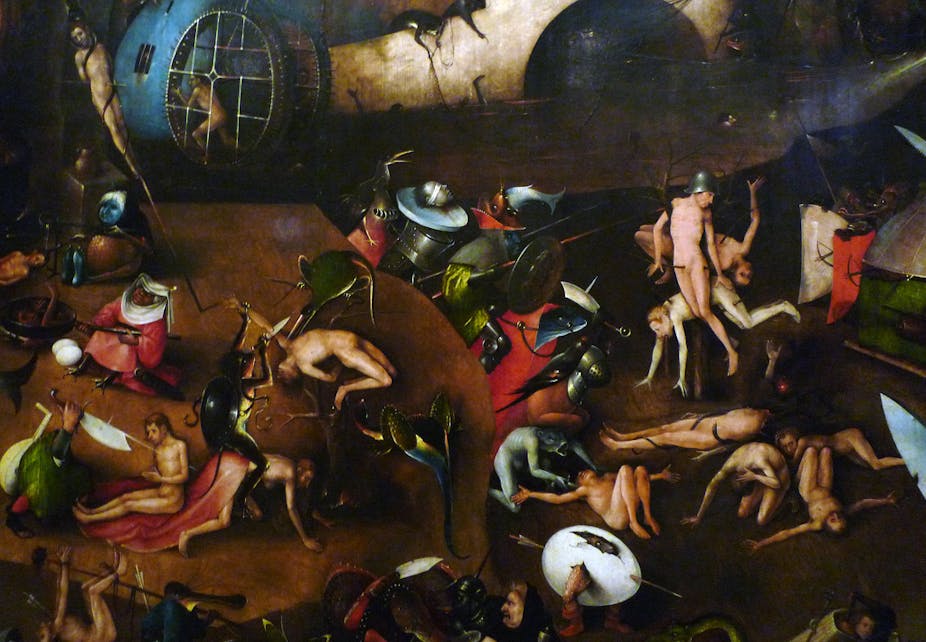I sometimes wonder what planet this country of ours is on. The environmental debate we are having seems to be in a parallel universe to the rest of the world. Having spent the last four years running one of Europe’s biggest environmental research laboratories, the Lancaster Environment Centre, I find Australia strangely out of kilter.
All I hear here is apocalyptic gloom and doom: either the planet is done for if we don’t act, or the economy is done for if we do! We have a highly polarised debate and even more polarised reporting; with too much hand-wringing and head-banging but too little rational discussion or consultation about what actually to do. Doing nothing isn’t an option.
If the sky is falling, people elsewhere are busy catching it
Let me be clear: the atmospheric carbon dioxide concentration is rising and the Earth is warming. The risks and uncertainties are huge but while we argue about and deny the obvious, others are just getting on with the job and addressing the issue as best they can.
Out of the Lancaster Environment Centre, we ran an enterprise and business partnerships program that engaged with over 450 local small to medium sized enterprises; not to convince them that there was a problem (we had no need), but to work with them to capture emerging opportunities in the low-carbon economy.
For example, a small printing company in Liverpool cut its energy consumption (and therefore its carbon emissions) by 50% through a combination of new processes and waste recycling, the installation of solar panels (yes, even in Liverpool!), and more efficient lighting and heating. As a result it was more profitable! How about that for a win–win?
So while we argue amongst ourselves Down Under – the end of the world as we know it versus “that tax” – others are innovating: making profits and creating jobs in a new global economy. While we argue we are missing the boat. Where will this leave us in decades to come?
I suggest someone in the Tony Abbott’s office buys him Roger Scruton’s new book Green philosophy: how to think seriously about the planet. Scruton is one of UK’s most respected right-wing philosophers and commentators, but he takes the environment and climate change seriously and suggests viable ways forward: action locally, by Edmund Burke’s “little platoons”; regulations and market structures that “return the costs of all transactions to those who incur them”; improvements to the laws of tort and even Pigouvian taxes where appropriate. Good heavens!
So philosophically, politically, and practically, the rest of the world is getting on with the future (UK, China, Mexico, South Korea, for example) and investment patterns are changing rapidly. The UK has an emissions trading scheme that has already stimulated much innovation and created new jobs. Coal is no longer king and electric vehicles are rapidly emerging as a viable alternative to petrol or diesel. My small, fuel-efficient turbo-diesel car will probably be the last conventionally fuelled car I will need to buy.
Here we have environmental activists predicting the end of the world whilst retreating to rural small holdings while the top end of town and the Opposition deny the obvious and rage about the carbon tax. Whatever happened to the inclusive middle that provides hope and a constructive way forward for all? While Nero fiddles…
Yes, we face huge challenges, but we have done so before in history. The Black Death killed about a third of Europe’s population. Is climate change any more threatening to us with our knowledge than the Black Death was to a world that had no idea what caused it?
Bugger luck, Australia needs to be a clever country
Australia is a very rich country (go and live elsewhere for a while to realise that), but as Peter Hartcher argues in The Sweet Spot, we didn’t get here by chance; we got here because we worked at reform for decades. We were clever. What we now require is rapid eco-innovation: facilitating the development and adoption of new, environmentally friendly, products, processes and technologies which we can use at home and sell to the world. We need to be clever again.
Another example: our research laboratory had strong Chinese linkages through a Royal Society “China Bridge” program. Through these programs, the UK facilitates collaboration with China in R&D for the emerging global economy. Our China Bridge project took UK researchers and companies to visit Chinese research institutions and companies and organised reciprocal visits. China is investing huge sums in environmental management technologies and already leads the world in many areas. Soon we’ll be buying new technologies from China. Smart and clever solutions create jobs and wealth. The mining boom won’t last forever.

I meet too many people either paralysed by the scale of environmental threats or denying their reality. Business as usual is not possible: but then it never was! Change is the only constant. Prediction always was hard. When times are uncertain, just begin!
The future will be different and more sustainable; innovation will happen, new ideas, processes and technologies will be developed and adopted. Yes, we have to recycle and reuse more; yes, we have to reduce demand and decarbonise the economy; but, no, going back to living in caves won’t do. We can do better.
Individuals can do many things to make a difference, even with present technologies. “Little platoons” can do a lot more. Forward-looking governments can do even more to stimulate innovation and prepare for the future. New ideas create new options.
Innovate together, and now
One place to begin is to get some joined-up thinking in the innovation system. On the end of the building, my UK environmental research lab had a dedicated space for start up companies and others to come and co-locate with us on campus. That gave them access to knowledge, networks, innovation, research and new ideas. They could chat with people at the forefront of knowledge and with each other about new market opportunities. We ran a big knowledge exchange program, including “speed dating” meetings for people to meet and share ideas. They, in turn, funded university research projects and hosted students for work experience. They got ideas and contacts; we got funds and job-ready students.
When did we forget faith, hope and charity? Faith in our ability to thrive and rise to challenges; hope for a new and better world, and charity to get beyond polarised debate. Our children and grandchildren need to be prepared and equipped for new challenges. Can we please talk about prudent responses and constructive actions, and learn from the rest of the world? Times of threat are also times of opportunity. Innovation is a fact of life; eco-innovation is an urgent priority. This is not Apocalypse Now! There is much to be done – and quickly.
Comments welcome below.

